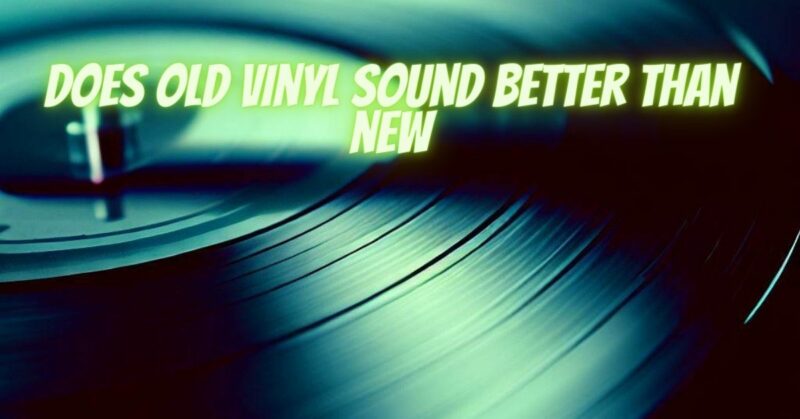Vinyl records have experienced a resurgence in popularity, with both audiophiles and music enthusiasts embracing the warm, nostalgic sound of analog recordings. However, a common question that arises in this vinyl renaissance is whether old vinyl records sound better than their modern counterparts. In this article, we will explore the factors that contribute to the sound quality of vinyl records, the differences between old and new vinyl, and whether one can definitively claim superiority over the other.
Understanding Vinyl Sound Quality:
To determine whether old vinyl records sound better than new ones, it’s crucial to understand the elements that influence sound quality in vinyl records:
- Vinyl Formulation: The quality of the vinyl material used can affect sound quality. Records pressed from high-quality, virgin vinyl tend to have less surface noise and better sound fidelity.
- Mastering and Cutting Process: The mastering and cutting process play a significant role in sound quality. Well-mastered records with precision cutting result in a superior listening experience.
- Pressing Quality: The pressing quality of the record, including the condition of the stampers and the pressing machines, can impact the sound. Poorly pressed records may have surface noise and distortion.
- Condition and Maintenance: Both old and new records must be in good condition and properly maintained. Scratches, dust, and wear can all affect the sound quality.
Old Vinyl Records:
Old vinyl records, particularly those produced during vinyl’s heyday in the 1960s and 1970s, can offer a unique and highly sought-after sound. Several factors contribute to the appeal of old vinyl records:
- Analog Warmth: Many vintage vinyl records were recorded using analog equipment and techniques, resulting in a warm and natural sound that is cherished by audiophiles.
- Original Pressings: Early pressings of classic albums often have the best mastering and pressing quality. These records can provide an authentic listening experience.
- Nostalgia: Some listeners are drawn to the nostalgic quality of old vinyl, as it reminds them of a bygone era of music consumption.
However, it’s important to note that not all old vinyl records are in pristine condition, and surface noise, pops, and clicks can be common, especially if they have not been well-preserved.
New Vinyl Records:
New vinyl records have seen a resurgence in production, with many artists releasing their music on vinyl once again. There are several advantages to new vinyl records:
- Improved Pressing Technology: Modern pressing techniques have evolved, resulting in records that are quieter, with fewer surface imperfections and better overall sound quality.
- Quality Control: Some record labels and pressing plants maintain strict quality control standards, ensuring that new records are produced to a high standard.
- Reissues and Remasters: New vinyl often includes reissues and remastered versions of classic albums, which can offer improved sound quality over old, worn copies.
The debate over whether old vinyl records sound better than new ones ultimately comes down to personal preference and the specific record in question. Both old and new vinyl records can offer exceptional sound quality when well-maintained and properly produced. It’s important to consider factors such as mastering, pressing quality, and the condition of the record, rather than assuming all old records are superior. Ultimately, the magic of vinyl lies in the joy it brings to the listener, regardless of its age or origin. Whether old or new, vinyl records continue to be a beloved medium for experiencing music in its purest analog form.


